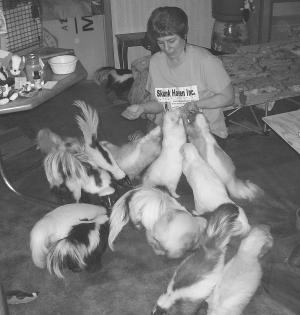2006 - Volume #30, Issue #3, Page #23
[ Sample Stories From This Issue | List of All Stories In This Issue | Print this story
| Read this issue]
Shelter Rescues Abandoned Skunks
 |
SkunkHaven provides a home to animals that are unwanted because they have behavior/health problems, or simply because an owner can't keep it any more.
Deborah Cipriani is president of SkunkHaven. She says the home base shelter in Ohio is the only domestic pet and wild skunk rescue that's both federally and state licensed.
The group has members and associates throughout the U.S., Canada, and several European countries.
Like many states, Ohio law requires a license to own a pet skunk, Cipriani says. It's illegal to take one from the wild, so most people acquire their skunks from licensed breeders or pet stores. Scent glands are surgically removed.
"Skunks are not an easy animal to take care of. They're much different than ferrets, dogs, or cats because of their time-demanding behavior and the fact that you've always got to cook for them. We feed them chicken, dog food, fresh vegetables and fruit," Cipriani says. "The shelter is here for people who realize too late that caring for a pet skunk is more than they bargained for."
Cipriani relies on veterinarian Dr. Frank Krupka of the Avon Lake Animal Clinic to deal with health concerns. Over the past six years, he's become a skunk specialist, drawing clients from far and wide.
"Besides our local owners, people from Indiana, Michigan, Alabama, and Florida have all brought me their skunks - just to name a few. It's amazing the distance people will travel for a skunk vet," Krupka says. "I've gotten phone calls from other veterinarians from Holland and Canada, too."
Cipriani and Krupka agree that skunks are not recommended for children. They must be trained not to bite and there are no approved rabies vaccines for skunks.
"If your skunk bites you, and the health department finds out, they can confiscate and destroy it," she cautions.
On the open market, pet domestic skunks can bring up to $600.
Contrary to popular belief, they are not limited to the traditional black-with-two-white-stripes colors and markings. There are a wide variety of coat patterns and alternate colors (all have some white), including: albino, brown, smoke, gray, apricot, champagne and lavender, just to name a few.
According to Cipriani, these colors were developed by one family who began pioneering domestic skunk breeding close to 70 years ago and is still in business today. Randy Ruby and his mother, Mae, sell skunks on their farm at New Sharon, Iowa.
Whether you have a pet skunk that you can no longer care for, or you'd like to adopt one, Cipriani and her network of skunk aficionados are there to help you.
Contact: FARM SHOW Followup, SkunkHaven Shelter, Deborah Cipriani, President, Box 201, Avon Lake, Ohio 44012 (ph 440 327-4349; daisyphew@comcast.net; www.skunkhaven.net).

Click here to download page story appeared in.

Click here to read entire issue
To read the rest of this story, download this issue below or click here to register with your account number.




